Create successful ePaper yourself
Turn your PDF publications into a flip-book with our unique Google optimized e-Paper software.
216 AMERICAN ANTHROPOLOGIST (N. s.. 48, 1946<br />
<strong>the</strong> beautiful little fea<strong>the</strong>r crest he still wears <strong>on</strong> top <strong>of</strong> his head.<br />
Three years ago in St. Vincent an old woman <strong>of</strong> Carib descent told me that<br />
she could remember, when <strong>the</strong> mo<strong>on</strong> was in eclipse, people saying that mttpwiya<br />
(bush-spirit) was trying to eat it. On such occasi<strong>on</strong>s, she said, <strong>the</strong>y used to<br />
stay up all night and refrain from eating, while women would “pound water<br />
in a mortar” and sing: ni.bd.re.; kaykaziwa arcyabudu duna: “I am scouring;<br />
we do eat tolzight water.”<br />
It is still a firmly held belief in <strong>the</strong>se islands-and not <strong>on</strong>ly am<strong>on</strong>g <strong>the</strong><br />
Caribs-that certain phases <strong>of</strong> <strong>the</strong> mo<strong>on</strong> are <strong>the</strong> <strong>on</strong>ly suitable times for <strong>the</strong><br />
performance <strong>of</strong> many activities, such as planting, hunting, or fishing particular<br />
species; felling trees to make dugouts or for lumber; and for <strong>the</strong> ritual bathing<br />
(in water c<strong>on</strong>taining divers and sundry leaves and herbs)4 <strong>of</strong> <strong>on</strong>e’s canoe,<br />
hunting-dogs, or self, as a protecti<strong>on</strong> or remedy against ill-luck or piay.<br />
THE BORER, LEGLESS, AND WINDY<br />
Of all <strong>the</strong> bright c<strong>on</strong>stellati<strong>on</strong>s and stars visible from <strong>the</strong>se latitudes, that<br />
comparatively faint cluster we call <strong>the</strong> Pleiades is by far <strong>the</strong> best known, today<br />
as in <strong>the</strong> past, to <strong>the</strong> inhabitants <strong>of</strong> <strong>the</strong> Antilles. In Dominica it is now called<br />
la Poussiizike,” but was formerly familiar to <strong>the</strong> Island Carib men as iromgbulime,<br />
“master <strong>of</strong> fine hot wea<strong>the</strong>r,” and to <strong>the</strong>ir women folk as slrik,<br />
“borer”--& name now applied in Creole to a species <strong>of</strong> land-crab plentiful in<br />
<strong>the</strong> rains. By it <strong>the</strong>y counted <strong>the</strong> passing <strong>of</strong> <strong>the</strong> years, and its name also<br />
signified “year.” Roths states: “The reappearance <strong>of</strong> <strong>the</strong> Pleiades <strong>on</strong> <strong>the</strong><br />
eastern horiz<strong>on</strong> so<strong>on</strong> after sunset (December) c<strong>on</strong>stitutes <strong>the</strong> passing <strong>of</strong> a<br />
year.” Bret<strong>on</strong> does not c<strong>on</strong>firm this and, however it may be, it is evident (see<br />
c<strong>on</strong>clusi<strong>on</strong> below) that <strong>the</strong> word atuplkali (which Bret<strong>on</strong> translates “resurrecti<strong>on</strong>,<br />
renovati<strong>on</strong>”) was employed by <strong>the</strong> Island Carib to designate <strong>the</strong><br />
heliacal rising <strong>of</strong> a star. In his Carib-French dicti<strong>on</strong>ary, Bret<strong>on</strong> gives Jirik-<br />
“Pleiades,” and in <strong>the</strong> French-Carib secti<strong>on</strong>: “Hyades”-sirik. This latter may<br />
be a mistake.<br />
An old Carib matriarch and friend <strong>of</strong> mine tells me that la Poussinitre<br />
was <strong>the</strong> elder bro<strong>the</strong>r <strong>of</strong> Trois Rois (<strong>the</strong> Carib c<strong>on</strong>stellati<strong>on</strong> includes Rigel<br />
and some minor stars, as well as <strong>the</strong> three Belt stars <strong>of</strong> Ori<strong>on</strong>. Carib M.S.,<br />
ebetilumq; W.S. mqbwikayc, both words meaning “thigh-withdrawn,” or<br />
“thighless”) in <strong>the</strong> days when both were Caribs before becoming stars. Of <strong>the</strong><br />
latter she told me <strong>the</strong> following story.<br />
Well now, Trois Rois loved <strong>the</strong> daughter <strong>of</strong> an old woman called Bihi or Bt’urnn<br />
(this word could mean ei<strong>the</strong>r “windy’) or “stabbing”). Bihi hated <strong>the</strong> boy so much that<br />
she would wait till he was asleep in his hammock, <strong>the</strong>n lift her skirt and break wind in<br />
Taylor, 1938.<br />
Roth, 1924, Secti<strong>on</strong> 936.

















